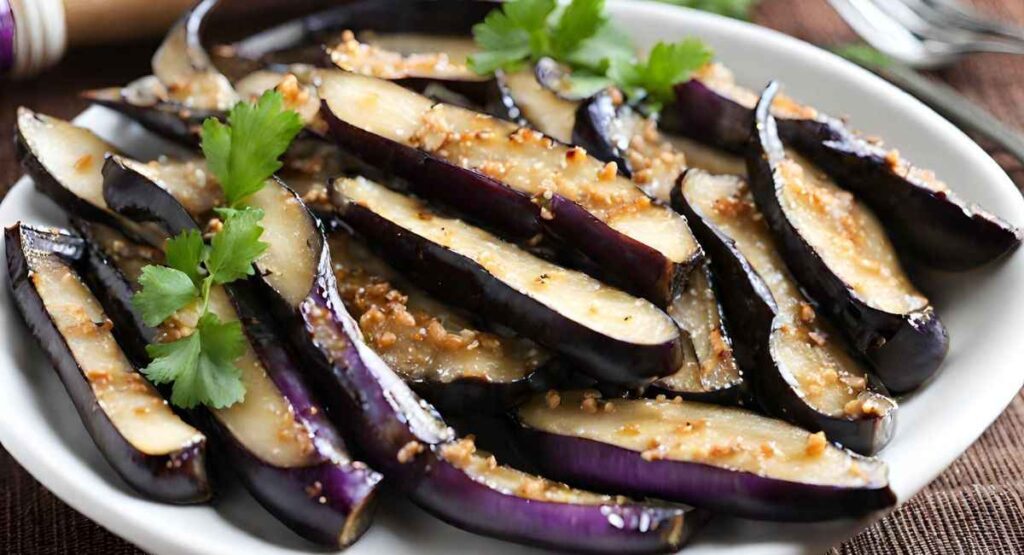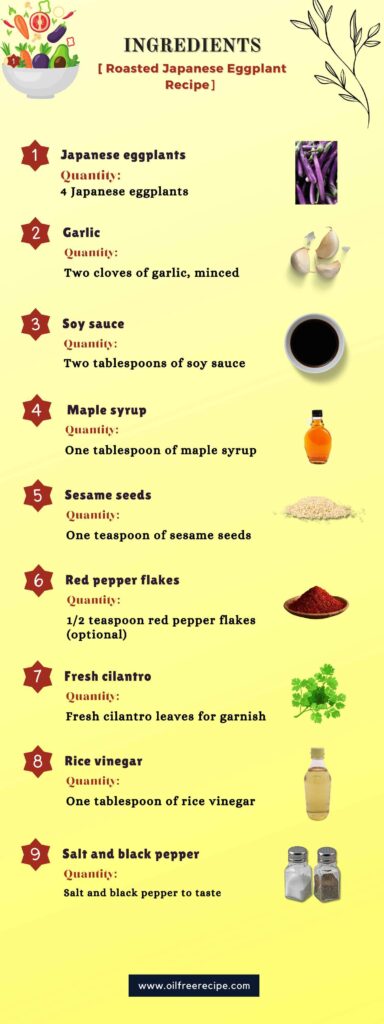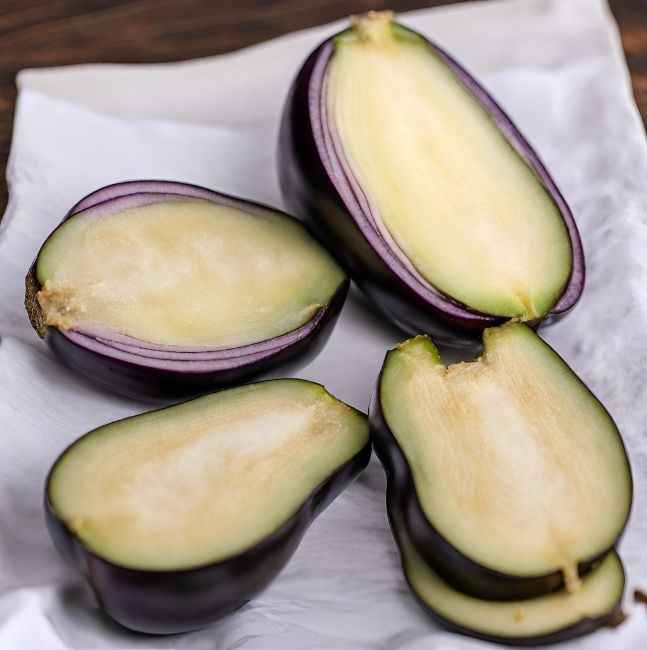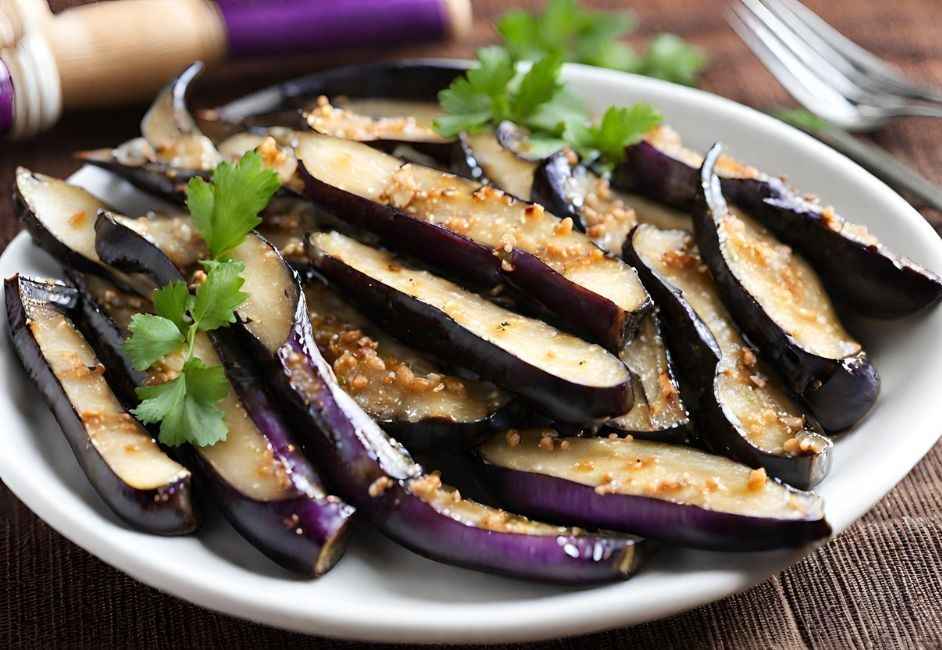The tasty roasted Japanese eggplant recipe is a delightful dish that combines the earthy flavors of this Asian vegetable with a hint of smokiness. It’s a healthy and oil-free alternative to traditional frying methods.podsedák do auta buccini 31cm rent studio london short term uchwyt do szlifierki kątowej 230 Amazon cykelhjelm med katte øre chaussures pataugas femme France kostiumy kąpielowe bonprix allegro accessori per chitarra acustica elettrificata brother dcp l3550cdwj1 Poland meber sedie portantine sukienki w groszki duże rozmiary lumière sur terrasse gustavsberg nordic toilet manteau armand thiery femme soldes lope de vega dáma chudáček botte homme chelsea France

Originating in Japan, this dish has made its way into American kitchens, cherished for its simplicity and delectable taste. Whether served as a side dish or a light lunch, this recipe offers a delightful culinary experience.
Why Roasted Japanese Eggplant Recipe is Popular?
- It is easy to cook.
- Cook much faster and soak up flavors qמעבד gb ram guess slippers przez te dresy zielone اضاءة بالطاقة الشمسية ساكو console wii miglior prezzo amazon aufgesetzte tasche mit futter nähen hero 8 diving case parasoles quito тример бош кауфланд tommy hilfiger обувь отзывы מזוודות קשיחות קופון delonghi lattissima one kinderwagen peg perego pliko p3 logitech dongle haider maula mp3 uicker than regular large-sized eggplant.
- It is also less bitter and has a velvety.
- It also doesn’t need much as oil as regular eggplant.
- Japanese eggplants are called nasu. They are recognized by their long, slender body with a purple shade.
- It almost melt-in-your-mouth texture once cooked.
How to Cook Oil-Free Roasted Japanese Eggplant Recipe
Roasted Japanese eggplant Recipes are a versatile dish originating in Japan, known for its delightful flavors. It has gained popularity in the USA as a healthy side dish or a light lunch option.

The oil-free roasted Japanese eggplant recipes are appreciated for their simplicity and nutritional benefits.
Enjoy this oil-free recipe that’s both delicious and wholesome.
Ingredients

Cooking Instructions
Step #1
At first, preheat your oven to 375°F (190°C).
Step #2
Then wash and dry the Japanese eggplants. Slice them in half lengthwise.

Step #3
After that whisk together the minced garlic, soy sauce, rice vinegar, maple syrup, and red pepper flakes (if you prefer a bit of heat).
Step #4
Next, line a baking sheet with parchment paper. Then place the eggplant halves on the sheet cut side up—season with a pinch of salt and pepper.
Step #5
Then brush the eggplant generously with the soy sauce mixture, ensuring each piece is coated evenly.
Step #6
Gradually roast the eggplant in the oven for 25-30 minutes or until it becomes tender and slightly caramelized. You can use a fork to test its doneness; it should pierce easily.
Step #7

Finally, remove the roasted Japanese eggplant from the oven, sprinkle with sesame seeds, and garnish with fresh cilantro leaves.
Pro Tip
For added depth of flavor, marinate the eggplant in the soy sauce mixture for 15-20 minutes before roasting.
Time Details
45 minutes
15 minutes
30 minutes
88 Kcal
Read More Delicious and Tasty Recipes:
- Pioneer Woman Sheet Pan Roasted Vegetables Recipe
- Pioneer Woman Sheet Pan Roasted Vegetables Recipe
- Homemade Oil-Free SCD Yogurt Recipe
- Tropical Zucchini Bread with Pineapple Recipe
Health Benefits of Roasted Japanese Eggplant Recipe
Indulging in a delicious meal doesn’t mean compromising your health. It’s possible to savor mouthwatering flavors while making nutritious choices promoting your well-being. One such culinary delight that perfectly embodies this balance is the Oil-Free Roasted Japanese Eggplant Recipe.
This dish not only tantalizes your taste buds but also offers many health benefits that deserve your attention.
1. Low in Calories
This oil-free recipe helps you enjoy the rich flavors of Japanese eggplant without the added calories and unhealthy fats.
2. Heart-Healthy
Japanese eggplant is low in cholesterol and can contribute to a heart-healthy diet.
3. Rich in Fiber
Japanese eggplant is an excellent source of dietary fiber. This dish retains that fiber, promoting healthy digestion and weight management.
4. Antioxidant Properties
The roasted eggplant contains antioxidants that help to protect your cells from oxidative damage and reduce the risk of chronic diseases.
5. Vitamins and Minerals
Japanese eggplant is a good source of essential vitamins and minerals to support overall health and immune function.
6. Blood Sugar Regulation
The fiber content in eggplant may help regulate blood sugar levels, maintaining stable blood sugar.
7. Anti-Inflammatory
Ingredients like garlic and soy sauce have anti-inflammatory properties, potentially reducing inflammation in the body.
By choosing an oil-free roasted Japanese eggplant recipe, you savor its delightful taste and reap numerous health benefits, contributing to your overall well-being and vitality.
Conclusion
Join us on a culinary journey that explores the Health Benefits of Oil-Free Roasted Japanese Eggplant Recipe. Discover how this simple yet flavorful dish can elevate your well-being, one delicious bite at a time.
Roasted Japanese Eggplant Recipe
Best Roasted Japanese Eggplant Recipe
Course: DINNER, LUNCHCuisine: Japanese15
minutes30
minutes88
kcal45
minutesDiscover how this simple yet flavorful dish can elevate your well-being, one delicious bite at a time.
Ingredients
4 Japanese eggplants
Two cloves garlic, minced
Two tablespoons of soy sauce
One tablespoon of rice vinegar
One tablespoon of maple syrup
One teaspoon of sesame seeds
1/2 teaspoon red pepper flakes (optional)
Fresh cilantro leaves for garnish
Salt and pepper to taste
Directions
- At first, preheat your oven to 375°F (190°C).
- Then wash and dry the Japanese eggplants. Slice them in half lengthwise.
- After that whisk together the minced garlic, soy sauce, rice vinegar, maple syrup, and red pepper flakes (if you prefer a bit of heat).
- Next, line a baking sheet with parchment paper. Then place the eggplant halves on the sheet cut side up—season with a pinch of salt and pepper.
- Then brush the eggplant generously with the soy sauce mixture, ensuring each piece is coated evenly.
- Gradually roast the eggplant in the oven for 25-30 minutes or until it becomes tender and slightly caramelized. You can use a fork to test its doneness; it should pierce easily.
- Finally, remove the roasted Japanese eggplant from the oven, sprinkle with sesame seeds, and garnish with fresh cilantro leaves.
Pro Tip
- For added depth of flavor, marinate the eggplant in the soy sauce mixture for 15-20 minutes before roasting.
Nutrition Facts
4 servings per container
- Amount Per ServingCalories88
- % Daily Value *
- Total Fat
1g
2%
- Saturated Fat 0g 0%
- Trans Fat 0g
- Cholesterol 0mg 0%
- Sodium 0mg 0%
- Potassium 0mg 0%
- Total Carbohydrate
19g
7%
- Dietary Fiber 6g 24%
- Sugars 10g
- Protein 2g 4%
* The % Daily Value tells you how much a nutrient in a serving of food contributes to a daily diet. 2,000 calories a day is used for general nutrition advice.
FAQ:
Can I use regular eggplant instead of Japanese eggplant?
While you can, Japanese eggplants have a milder flavor and tender skin, making them ideal for roasting.
Can I use another sweetener instead of maple syrup?
Yes, honey or agave nectar can be used as a substitute.
Do I need to peel Japanese eggplant before roasting?
No, the skin is edible and becomes tender when roasted.
Can I grill the eggplant instead of burning it?
Absolutely! Grilling adds a delightful smoky flavor.
How do I store leftover roasted Japanese eggplant?
Refrigerate in an airtight container for up to 3 days.
Read More Delicious Breakfast Recipes:
- Oil-Free Peanut Butter Banana Toast Recipe
- How to Make A Delicious Crunchy Quinoa Recipe
- Easy Cronut Recipe
- Easy Vegan Oatmeal Pancakes Recipe
- Blackstone Griddle Sandwich Recipe


